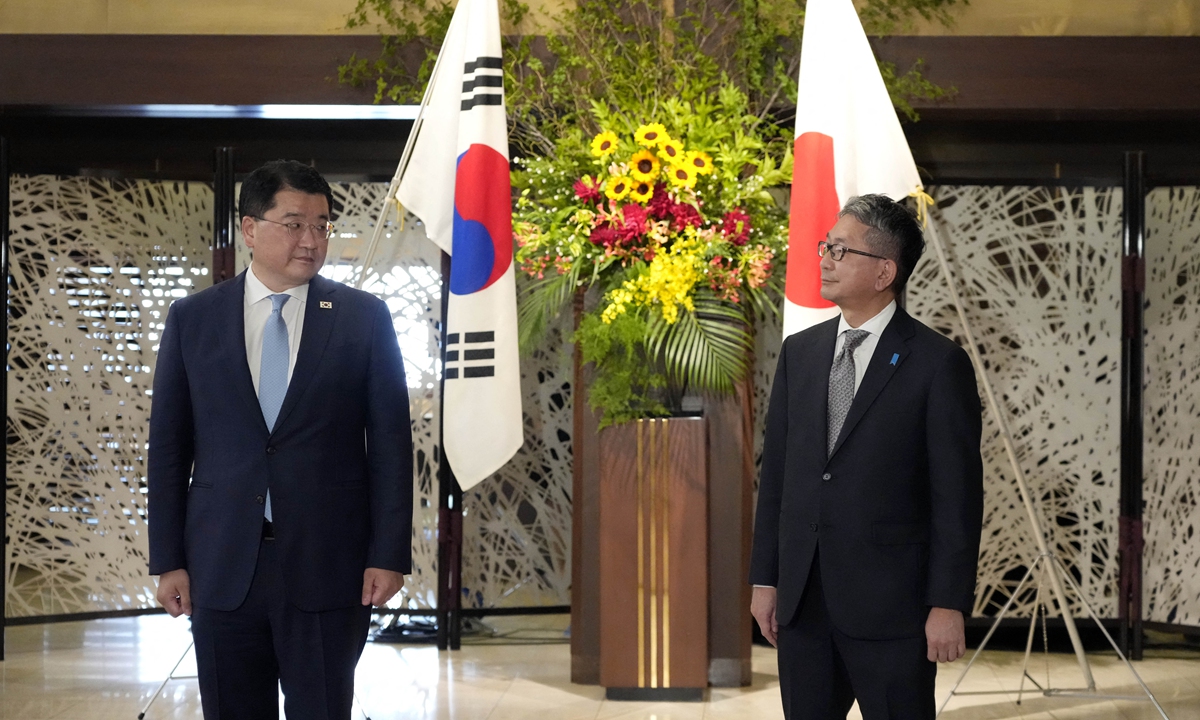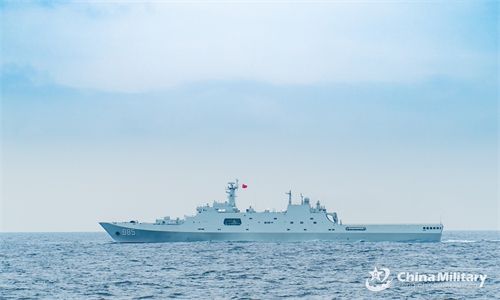Abandoned press conference shows US' decreasing capability in mediating S.Korea-Japan disputes

South Korea's first vice foreign minister Choi Jong-kun (L) and Japan's vice foreign minister Takeo Mori Photo: AFP
The territorial disputes between Japan and South Korea - two main allies of the US - resurfaced as their vice foreign ministers left a "joint" press conference with their US counterpart on Wednesday over the disputes. Analysts said given the US' decreasing influence and limited capability in mediating disputes among allies, disputes between Japan and South Korea may affect the trilateral mechanism, making it more difficult for the US to draw small cliques in Northeast Asia to contain China.
South Korean's first vice-foreign minister, Choi Jong-kun, and Japan's vice foreign minister, Takeo Mori, left the press conference on Wednesday in Washington when they were supposed to stand next to US deputy secretary of state Wendy Sherman to take questions from media on their discussions over "regional tensions, including Chinese military activity in the South China Sea and North Korea's nuclear weapons program," the Guardian reported.
The cancellation of the joint news conference was due to the disputed Dokdo/Takeshima islands as a spokesperson at the Japanese embassy in Washington said Japanese officials had withdrawn from the media appearance in protest at a recent visit to the disputed islands by the chief of the South Korean police.
"This was quite an embarrassing situation for Sherman. Although she explained the cancellation of the joint conference was not related to the earlier trilateral meeting, the disputes between Japan and South Korea did affect trilateral relations," Da Zhigang, director and research fellow of Institute of Northeast Asian Studies at Heilongjiang Provincial Academy of Social Sciences, told the Global Times.
Given the historical and current disputes, as well as the sentiments of the two peoples, it is possible there may be more clashes between Japan and South Korea and more embarrassing moments like this one, Da said, noting that the US is also incapable of mediating between Japan and South Korea.
Territorial disputes are not the only problems between South Korea and Japan. The two countries have experienced their lowest ebb in relations over historical issues and current ones - for example, Japan's discharge of treated water from the Fukushima nuclear power plant into the Pacific Ocean, which regional countries strongly oppose.
The deepening contradictions between Japan and South Korea are inevitable, and the main reason lies with Japan - with the rise of the right wing in Japan, frictions between Japan and South Korea rooted in historical issues have deepened, Yang Xiyu, a senior research fellow at the China Institute of International Studies in Beijing, told the Global Times.
The complicated Japan-South Korea relations pose a problem for the US-Japan-South Korea alliance. For example, the work on sharing intelligence would be more difficult. This would also hinder the US' Indo-Pacific strategy as Japan and South Korea are indispensible, Yang noted.
Experts also noted that the rise of right-wing forces in Japan was encouraged by the US, and while the US is working hard to promote its Indo-Pacific strategy, its two allies in Asia are growing far apart, making it hard for the US to draw small cliques in Northeast Asia.
Due to different diplomatic strategies, South Korea and Japan also differ on whether to closely follow the US especially on containing China, Yang said, noting that Japan wants to promote its "normalization" and rise again as a great power with its core pursuit for military normalization. This is why it closely follows the US on its anti-China policies.
South Korea does not want to bond tightly with the US to confront another great power, said Yang.
Japan seemed to play a leading role for the US in containing China. Aside from hyping the Taiwan question, it also conducted an anti-submarine exercise with the US in the South China Sea, targeting China.
Some politicians in Japan think that they can earn US trust by playing tough on China. But the signal sent from the top leaders' meeting between China and the US was the two countries agreed to manage disputes, which may disappoint the right wing in Japan, analysts said, noting that the fate of being abandoned by the US may also wait for Japan if it goes further astray.


